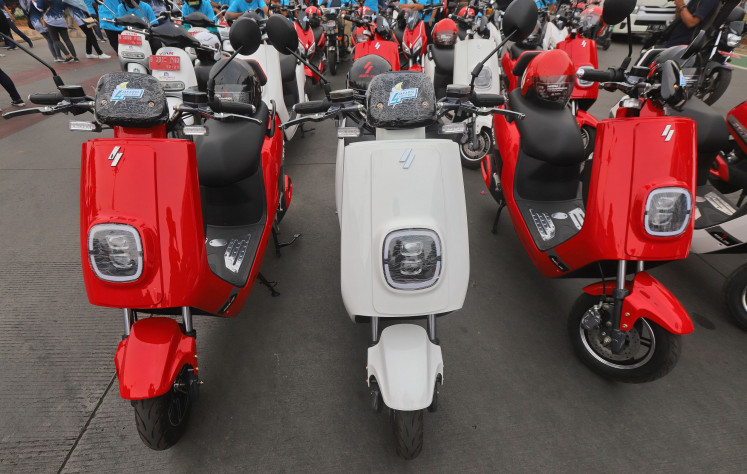Kadin urges govt to protect tea industry
The Indonesian Chamber of Commerce and Industry (Kadin) has called on the government to increase import duties for tea products and implement non-tariff barriers to safeguard the domestic tea industry
Change text size
Gift Premium Articles
to Anyone

T
he Indonesian Chamber of Commerce and Industry (Kadin) has called on the government to increase import duties for tea products and implement non-tariff barriers to safeguard the domestic tea industry.
The business group said the government should revise the existing 20 percent import duty policy for tea products as the current level was insufficient to ease the stiff competition between local and foreign tea players, who are expanding to Indonesia.
“We will make our recommendations to President Joko ‘Jokowi’ Widodo to review the current 20 percent import duty for tea products, in accordance with World Trade Organization [WTO] rules,” said Rudyan Kopot, Kadin chairman for the permanent committee of plantations, in a discussion in Jakarta recently.
In order to help reduce massive tea imports, the government should levy a 40 percent import duty for bulk tea, and more than 40 percent for packaged tea products, said Rohayati, chairwoman of the Indonesian Tea Farmers Association (Aptehindo), during the forum.
According to the forum, other countries such as India and Turkey have made efforts to protect their local tea industries by applying high import duties for tea products of 114 percent and 145 percent, respectively.
The recommendation from Kadin was based on concerns raised by local tea industry players during the discussion.
Iriana Ekasari, head of internal and foreign affairs at the Indonesia Tea Board, said that while Indonesia was a big market for tea, it was flooded by many imported products of the commodity from Vietnam and Taiwan, among other countries.
According to the speakers at the forum, the local tea industry faces big challenges from declining national production amid increasing imports, especially of low-grade black tea and high value-branded packed tea.
About 3,000 hectares of tea plantations in Indonesia disappear every year because of land conversion and abandonment. The tea plantation area shrunk by 6.3 percent to 84,316 ha in 2018 from 89,978 ha in 2014.
On the other hand, national tea production cannot meet domestic demand, which increases every year. Thus, in order to match the demand, Indonesia has begun to import more tea from overseas.
Given this situation, Indonesia must innovate and improve the quality of its tea products to be able to compete with foreign products, according to the speakers. The tea board said the industry needed government support to achieve that goal.
“Hopefully the tourist sector can provide room to promote Indonesian tea. Kadin can also include Indonesian tea in international trade missions and diplomacy,” Iriana said.
Kadin has also urged the government to implement non-tariff barrier requirements, such as halal certification and mandatory Indonesian National Standards (SNI) to reduce low-quality imported tea coming into the country.
Another non-tariff barrier that could help the local industry is a requirement for imported tea to comply with international maximum residue levels (MRL) as this would create a level playing field with regulations in other countries, the tea board suggested.
The strict MRL level requirement in the European Union, for example, has suppressed Indonesian tea exports. The EU requires that anthraquinone — a chemical associated with packaging — in imported tea should be as low as 0.02 parts per million (ppm). One ppm is equal to 1 milligram per liter.
“The lobbying with Europe has to be strengthened; that should run alongside diplomatic support. Regarding this matter, Kadin will play a role through trade missions,” said Kadin chairman Rosan P. Roeslani.









